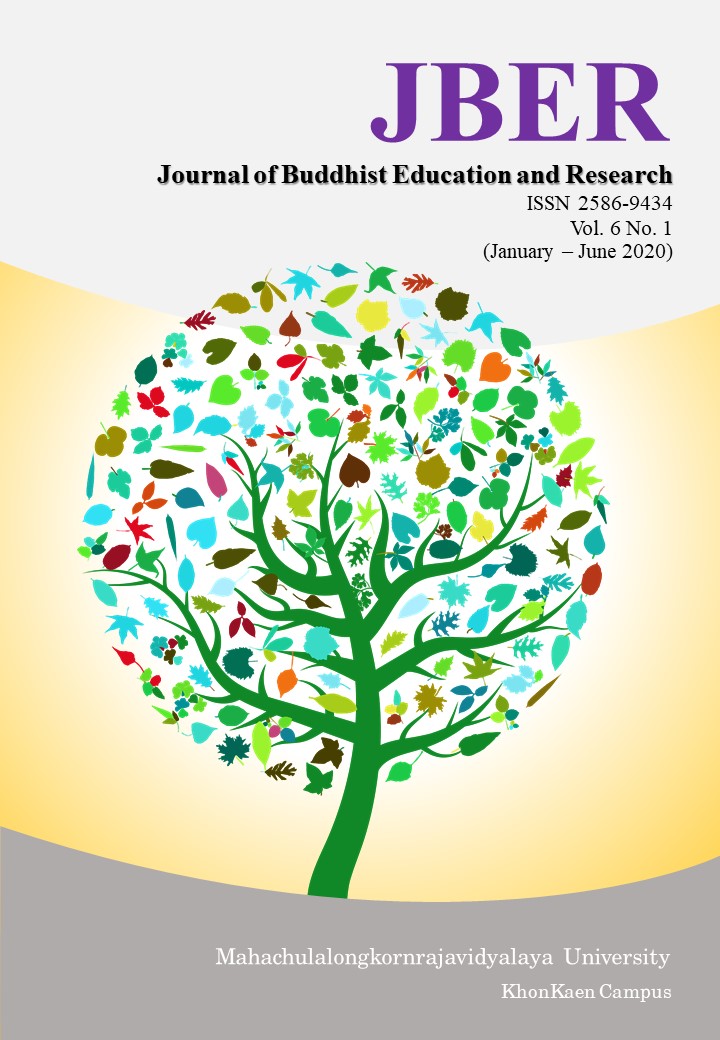THE APPLICATION OF THE FOUR IDDHIPADA DHAMMAS TO PROMOTE LEARNING SKILLS OF STUDENTS IN NONGSONGHONGWITTHAYA SCHOOL, NONGSONGHONG DISTRICT, KHON KAEN PROVINCE
Keywords:
promotion, the four Iddhipada, learning skillsAbstract
The aims of this research were: to study the conditions and ways and suggestions for applying the principles of the four Iddhipada dhammas (path of accomplishment) to promote the learning skills of the students in Nongsonghongwitthaya school, Nongsonghong district, Khon Kaen province. This study was conducted by means of the quantitative research methodology. The samples in this study included 114 teachers and educational personnel. The data collection was made by means of a questionnaire and an interview form.
The research results were as follows:
The analyzed results showed that the opinions on the learning management based on the four Iddhipada dhammas were statistically rated at a high level in overall perspective. In the aspect of education, there are the actions that show the feeling of wanting to study successfully, interest in learning, satisfaction with actions and intention to study or to fulfill assigned duties with diligence. In the aspect of behavior, there is behavior that shows any work to be completed on time, including completing the assigned duties as scheduled, attending class on time, behaviors that show the feeling of wanting to learn and to work successfully without discouraging when facing any obstacles, a feeling of using wisdom in contemplation, finding and fixing work defects. In terms of family responsibility, there is a responsible behavior for the commitment to act or treat the family, a responsible behavior that demonstrates a sense of commitment to work with determination, responsibility in curiosity and satisfaction with actions. In the aspect of school responsibility, there is a responsible behavior that demonstrates the feeling of wanting to study successfully, the responsibility for the school to adhere to the rules that shows a feeling of using wisdom in contemplation, finding and fixing work defects, a responsible behavior to the school regarding adherence to the rules, a sense of commitment to work with determination.
Educational suggestions are that there should be application of working principles and success in education to complete the curriculum according to the specified criteria; in the aspect of behavior, the principles of the four Iddhipada should be used to control the behavior of the learners by allowing the learners to apply in various matters; in the aspect of family responsibility, the four Iddhipada can be adapted to create responsibility for things in the family. In the aspect of school responsibility, the teaching and learning management using the suitable method with the content and basis of students, such as problem solving teaching methods and the four Iddhipada teaching methods should be used.
References
PhraDhammapidok (Po-or Payutto). Democracy Creation. (Bangkok: Business Competitors, 1995).
Srinakharinwirot University, Motto. [Online], Source: http://www.swu.ac.th/history.php, [15 January 2019]. Nong Song Hong Witthaya School Khon Kaen
Province "School information", [online], source: http://www.watbangtoei.ac.th/ [21 January 2019].





